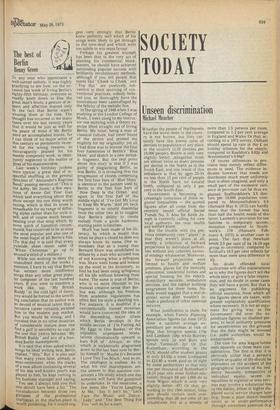The best of Berlin
Benny .Green
To any man who appreciates a well-turned melody, it was highly gratifying to see how, on the occasion last week of Irving Berlin's eighty-fifth birthday, everyone so readily knelt down to kiss the great man's boots, a gesture of respect and affection marred only by the fact that Berlin wasn't wearing them at the time. The thought has occurred to me many times over the last twenty years that it would be just as well for his peace of mind if Mr Berlin were an accomplished ironist, for I can think of no major artist of this century so persistently revered for the wrong reasons, so extravagantly praised for his merely competent work, so obsti!lately neglected in the matter of Biost of his masterstrokes.
Last week's birthday junkets were typical: a great deal of resPectful shuffling in the general direction of 'Alexander's Ragtime Band,' passing mention of 'This is the Army, Mr Jones,' a few mentions of Annie Get Your Gun Which said everything about that Show except the one thing worth saying, which is that its score is remarkable for its range of differing styles rather than for style itself, and of course much breastbeating over that song which, by some quirk of historical circumstance, has contrived to be at once the most popular and also one of the most bagal of all Berlin's hits. (To this day it is said that every Yuletide, sheet music sales of ' White Christmas' go up to around a third of a million.)
While not wishing to deny the undoubted merit of the works I mention, I have to say that Berlin has written more indifferent songs than any other great popular composer of the last hundred Years. If you were to examine a work like, say, ' My British buddy' in the cold light of dawn, You would be forced to the unwilling conclusion that its author was SO devoid of musical talent that a lucrative career certainly Awaited him in the modern pop market. But you would be wrong, and I . contend that in no other musician
of considerable stature does one find a gulf in sensibility so vast as the one that yawns between 'My British Buddy' and any of a hundred Berlin masterpieces.
It is said that when asked which songs he liked writing best, Berlin replied, " Hits." But it is also said that many years later, already in semi-retirement, when the tracks of a new album containing several of his less well-known pearls was Played to him, he kept turning to his business manager and saying, You see, I always told you that one should have been a hit." The contradiction between those two glimpses of the professional craftsman in the market-place is worth pondering, for it would sug gest very strongly that Berlin knew perfectly well which of his songs were likely to get through to the tone-deaf and which were too subtle to win mass favour.
Perhaps his greatest triumph has been that in the very act of planting his commercial blockbusters, he should have achieved astounding popular success with brilliantly revolutionary methods. although if you tell people that tunes like 'Cheek to Cheek' and 'Top Hat' are positively subversive in their spurning of conventional practices, nobody believes you, so thoroughly have the innovations been camouflaged by the felicity of the melodic line. In the spring of 1948 when I was studying at the London College of Music, I went along to my instructor one morning with a theory exercise lifted straight out of Irving Berlin. My tutor, being a man of classical culture, had never heard of the device and praised me mightily for my originality, yet all I had done was to borrow the first four harmonies of Berlin's 'Blue Skies ' And sketch in a new melodic fragment. But the real point about this story is that if I was guilty of plagiarising Berlin, so was Berlin. It is revealing that the progression of chords comprising the first four bars of' Blue Skies ' is identical to the pattern used by Berlin in the first four bars of ' How Deep Is the Ocean' and again in the first half of the middle eight of I've Got My Love to Keep Me Warm.' And yet each fragment is so utterly dissimilar from the other two as to suggest that Berlin's ability to create melody from a given harmonic starting point is limitless.
Much has been made of his illiteracy, by which is meant that when he plays a chord he does not always know its name. One remembers that as a young man Bernard Shaw was annihilated in debate by a man who accused him of not knowing What a syllogism was. Shaw went home and looked up the word in the dictionary, to find he had been using syllogisms all his life without knowing their name. The same is true of Berlin, who is no more illiterate in the musical creative sense than Berlioz was, although his freedom from academic regulations has often lent his style a dazzling wit. For instance, it is doubtful if a conventionally trained musician would have conceived the idea of the descending major triads which Berlin develops in the middle section of I'm Putting All My Eggs in One Basket,' or the impudent unprepared modulations chromatically upward in bars 9-16 of 'Always,' an idea which is incidentally plagiarised down to the last bass note by Berlin himself in ' Maybe It's Because I Love You Too Much.' And so on. The catalogue is endless. As to what his real masterpieces are, the answer to that question constitutes a life-study which one day someone will have the gumption' to undertake. In the meantime, a few items like 'You're Laughing At Me,' 'Say It Isn't So," Let's Face the Music and Dance,' ' Lazy ' and 'The Best Thing For You 'will do for a start.


































 Previous page
Previous page